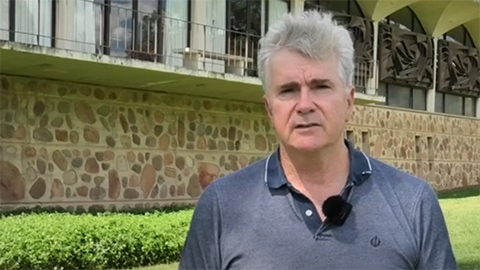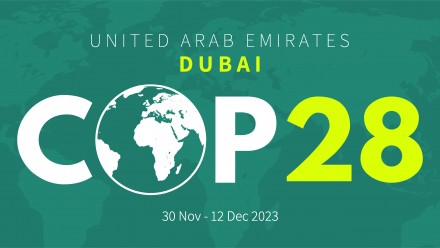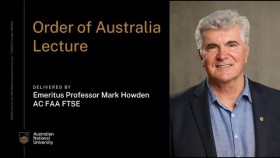ANU at COP28 - Events, News & Podcasts
The 2023 United Nations Climate Change Conference, or COP28 took place from 30 November to 12 December 2023 in Dubai, United Arab Emirates. The summit brought together more than 2000 speakers from around the world, with a program geared towards real world solutions that close the gaps to 2030 and respond to the Global Stocktake.
For the crucial information you need to know before, during and after COP28 this page will be updated with expert commentary by researchers from across the ANU.
Media & Commentary
Final COP28 agreement signed, committing to 'transition away from fossil fuels'. The Australian Science Media Centre, 14 December
There is now a final COP28 Agreement. The final agreement calls for countries to quickly shift energy systems away from fossil fuels in a just and orderly fashion, qualifications that helped convince those holding out. Under the deal, countries are also called on to contribute to a global transition effort — rather than being compelled to make that shift on their own. "This is the first time that a COP decision calls for the decline of not only coal but also oil and gas. The fact that it was struck in the Gulf region, and presided over by an oil executive, makes it more powerful" says ICEDS Head of Energy Professor Frank Jotzo.
Cop28 agreement is progress – but there is still plenty of wriggle room for any country, including Australia, The Guardian, 14 December
Cop28 is the first time that a UN decision acknowledged the need for the decline of not only coal but also oil and gas, and called on all countries to work towards it. The fact that it was struck in the Gulf region, and presided over by an oil executive, might have increased the latitude for oil and gas but also sets an important marker argues ICEDS Head of Energy Professor Frank Jotzo.
Draft COP28 agreement text criticised for fossil fuel omission, The Australian Science Media Centre, 12 December
A draft agreement at the COP28 climate change summit was released overnight, and a group of countries including Australia have criticised the lack of a commitment within the draft to 'phase out' or 'phase down' fossil fuels. The agreement instead refers to 'reducing both the consumption and production of fossil fuels'. ICEDS Director Professor Mark Howden comments that "The draft text misses out on the urgency component of the transition. To respond effectively to the climate challenge the text should read that reductions in fossil fuel use should be done in a ‘rapid, just, orderly and equitable manner’."
COP28: Turning the tap off slowly – why Australia’s decision to end overseas fossil fuel finance matters, The Conversation, 7 December
Until recently, financing fossil fuel projects has been relatively easy. But that is slowly changing. At the COP28 climate negotiations yesterday, Australia announced it will sign the Glasgow Statement and will no longer finance international oil, gas and coal projects. Writing for The Conversation, Associate Professor Christian Downie and Maxfield Peterson explain why this is an important step.
COP28 side event: Border Carbon Fees, with the WTO & Friends, Tennant Reed via LinkedIn, 7 December
Tennant Reed, Director - Climate Change and Energy at the Australian Industry Group and ICEDS External Advisory Committee member, summarises discussion at a COP28 side event on Border Carbon Fees which included contributions from Professor Frank Jotzo, Head of Energy at ICEDS.
The future present: BAU & Climate Change, Sustainability Bites, 30 November
In this op-ed, Professor Quentin Grafton offers his thoughts on different climate and emissions projections and the impacts of conducting 'business as usual'. Quentin Grafton is Professor of Economics, Australian Laureate Fellow, Convenor of the Water Justice Hub and Director of the Centre for Water Economics, Environment and Policy at the ANU Crawford School of Public Policy.
The Global North Is Alienating the Global South Before COP28 Even Starts, Foreign Policy, 27 November
In this op-ed, Dr Manal Shehabi argues that dismissing the climate summit because its host is an oil producer is hypocritical and dangerous. Dr Shehabi is an ICEDS Member and Associate Faculty Member at the Faculty of Asian and Middle Eastern Studies at the University of Oxford.
On the road to COP28, Pacific Climate Change Centre closes knowledge gap on IPCC work and why it matters for the Pacific, Secretariat of the Pacific Regional Environment Programme (SPREP), 26 November
Professor Mark Howden joined a pre-COP28 event with the IPCC Chair, Professor Jim Skea, which focussed on Strengthening Pacific Engagement in the IPCC Assessment Reporting Cycles and Process. The event hosted by The Pacific Climate Change Centre (PCCC) provided the most up-to-date synthesis of relevant climate change information to diverse Pacific Island audiences for climate programme implementation and policymakers in preparation for COP28.
Videos

Post-COP28: What happened and where to next?
Leading climate and energy researchers from The Australian National University reflect on the 2023 United Nations Climate Change Conference, otherwise known as COP28, and discuss key takeaways for Australia and our near region.

Fiona Beck at COP28: how Australia can fuel the global energy transition, ANU College of Engineering, Computing and Cybernetics, 4 December
In the video below, Associate Professor Fiona Beck explains the key messages she'll be talking about at this year's United Nations Climate Change Conference, including the opportunities for Australia to build an export industry based on renewable energy. Read more COP28 commentary from Associate Professor Beck here.

Climate scientist reacts to COP28 president's controversial comments, CNN, 6 December
The ANU Institute for Climate, Energy & Disaster Solutions director, Professor Mark Howden, speaks with CNN's Rosemary Church. They examine COP28 President Sultan Al Jaber's remarks about there being "no science" behind the phasing out of fossil fuels.

Clean energy and commodity exports as an opportunity for fossil fuel rich economies, Event Recording, 5 December
Coal, oil and gas exporting countries fear negative effects from fossil fuel phase-down. Yet demand for zero-emissions fuels and commodities is a large upside. Fossil fuel exporting countries can establish new energy, processing and mining industries that will thrive in a net-zero world economy. This COP28 Side Event featured Seyed Moslem Mousavi Dorcheh, Mohammad Hossein Fardad, Chris Bataille, Manal Shehabi, Steffen Kallbekken, Fiona Beck & Frank Jotzo.

Hydrogen as a pathway to decarbonisation: What can Australia supply?, Event Recording, 5 December
Clean hydrogen and hydrogen derivatives are expected to make an important contribution to decarbonisation. Australia has the necessary prerequisites to become a large hydrogen producer and exporter of commodities that are derived from hydrogen or that use hydrogen. Speaking at this COP28 Side Event were Associate Professor Fiona Beck, Professor Frank Jotzo, James Hetherington, Lars Hansen & Dr Carsten Rolle.
What should be on the agenda on climate finance in COP31? Pacific and Australian perspectives, Event Recording, 6 December
Ensuring adequate finance to meet the climate change response needs of the most vulnerable remains a global challenge, no more so than for SIDS in the Pacific. This COP28 side event was moderated by Sala Dr George Carter, with panelists Professor Howard Bamsey, Galumalemana Anne Rasmussen, Care Rogers and Fred Patison.
Audio & Podcasts
'Not clear enough': Expert slams 'weak' agreement established at COP28, NewstalkZB, 14 December
Professor Mark Howden joined Heather du Plessis-Allan Drive to talk through the final COP28 agreement noting "There's lots of wriggle room here and it's probably not clear enough in terms of its goals."
Hurry up and wait - negotiating the climate crisis, Democracy Sausage, 21 November
The climate is in dangerous territory as the globe prepares to meet in Dubai for COP28. So, what’s on the table in this year’s discussions? And will any new commitments be enough to keep people safe? On this episode of Democracy Sausage, Dr George Carter and Professor Janette Lindesay join hosts Mark and Marija to discuss gradual progress in the context of a fast-changing climate.
The challenges facing COP28, SBS News, 1 December
The call to agree an end to fossil fuel production at this COP has been growing - a key sticking point for many producers like Australia. Featuring commentary from Professor Mark Howden.
Global carbon dioxide emissions at record highs, ABC Radio, 6 December
Global carbon emissions from fossil fuels have increased over the past year despite most of the world committing to net zero targets, according to new research. Professor Frank Jotzo discusses with CSIRO's Dr Pep Canadell and the ABC's Gavin Coote.
Negotiations intensify as COP28 deadline nears, ABC Radio, 7 December
Negotiations are intensifying at the COP28 UN climate summit in Dubai as the deadline for an agreement draws nearer. Featuring Professor Mark Howden.













